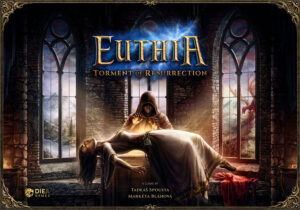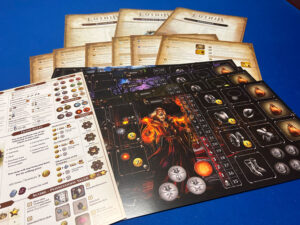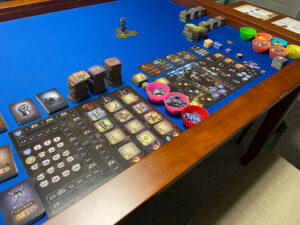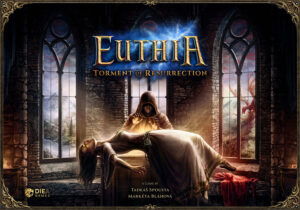 I have always wanted to play Euthia, but my backlog of games prevented me from backing either its original Kickstarter or the reprint. I heard that it was a combination of Mage Knight and Runebound, two of my favorite fantasy adventure board games.
I have always wanted to play Euthia, but my backlog of games prevented me from backing either its original Kickstarter or the reprint. I heard that it was a combination of Mage Knight and Runebound, two of my favorite fantasy adventure board games.
Well, the gaming gods smiled upon me as not only have I been blessed with reviewing Euthia, but a Kickstarter campaign for the original game, as well as its newest expansion, Cruel Frost, recently launched.
Is this game worth backing? Absolutely, with a few caveats discussed below.
Gameplay Overview:
Euthia: Torment of Resurrection (Euthia, going forward) is a competitive/cooperative/solo fantasy adventure board game for one to four players. This is NOT a campaign game (cheering begins), but a sandbox, open world, scenario-driven adventure (cheering intensifies). There are a total of eleven scenarios included in the base game, with one of them having three variations. Each one can be played competitively (race to points/completing an objective only – no PvP), cooperatively, or solo (TECHNICALLY, one is coop/solo only), with tweaks to combat and other areas to balance the different play styles. Games last between an hour and four hours, depending on the scenario chosen and the player count.

The number of rounds is determined by the scenario played. Each round consists of the following steps:
- Start of round
- Players place action tokens (mining, trade, and combat) on their Hero Board
- Ready all used Items, Abilities and Gems
- Player Turn
- Move your Hero by spending an Action Token and moving that many hexes
- New map tiles are placed IMMEDIATELY if your hero reaches the edge of the board
- Unused movement points are not lost
- Spend an Action Token as follows:
- Combat if you are on a hex with a monster
- Trade if you are on a hex with a Place of Trade that has been liberated (no monster)
- Mining if you are on a mining hex that has been liberated
- Free Actions, such as healing at a church, confronting elementals, finding treasure, and fulfilling quests
- Move your Hero by spending an Action Token and moving that many hexes
After every player has completed a turn, the round marker is moved up one and, if that was the final round, the game ends; otherwise, the next round is played.
The winner is determined by who has collected the most reputation points through adventuring, from killing monsters, liberating hexes, and collecting treasures. Only three of the eleven scenarios have a true “defeat” condition, where if the final objective is not completed, all players lose. In all the others, even if the final objective is not completed, you are made to feel guilty because you failed the realm; however, you still proceed to the final scoring to crown a victor.

Game Experience:
What made me want to be resurrected into the world of Euthia?
OPEN WORLD
The biggest draw for me is the open world. This game has the best map generation in any board game I have played. Even using the same tiles, each game map ends up completely differently. One of my games had three Treasure hexes in a row, making the start of that game easier than most. Another spawned an Air elemental next to a monster I had just engaged in combat (elementals impact adjacent hexes, and Air flips your highest die to its opposite side), leading to my demise. Euthia has so many different locations to interact with—three different merchants to trade with, a multitude of quests to undertake, four elemental types to interact with, and three different types of mining hexes to… mine. This does not include scenario specific objectives added into the map tile mix. The game provides more tiles than needed, creating variability in what appears in your game. This is also where the Mage Knight comparison comes in—building your open world as you play.
MOVING AROUND THE MAP
Moving around the open world is an excellent balancing mechanism of moving vs. using actions. Every player gets two copies of three action tokens: Move 1/Mine, Move 2/Trade, Move 3/Combat.
Each turn you need to decide if you are using all three tokens, as you can save one for the next round (for example, if you wanted to do two separate combat actions). But if you do use a token, you cannot use the action that is on that token. So, for example, moving far sacrifices your ability to combat a monster that round. This becomes even more important in a competitive game, as every monster or treasure tile can only be claimed once (marked with that winning hero token as a reminder, as well as for final scoring), or a fee must be paid to the player(s) who have been to a liberated merchant, natural resource, or confronted elemental before you. While it is very simple, due to the unique map layouts, the movement/action puzzle remained a favorite mechanism of mine throughout my multiple plays.

HEROES
But you need more than a good adventure map for a good adventure game. Luckily, the six heroes included in the base game are all different, as well as enjoyable, to play. There are three spellcasters and three melee characters to choose from. Dral is your basic smash bad guy, loot, repeat warrior; but he also is proficient at mining and “negotiating” with merchants. On the other hand, there is Maeldur, a typical mage who is an expert in fire and lighting magic, dabbling in alchemy. Each of the other four characters share some skills, but also have unique skills that are only available to their character.
HERO GROWTH
This is another area where Euthia truly shines. At certain reputation levels, up to reputation eighteen, you unlock one of two skills that can be learned by your character, assuming you have the space on their Hero board. After reputation eighteen, at certain levels, one skill will be unlocked, up to reputation forty. On top of these skills, there are three distinct types of merchants, each with its own pool of 70+ items to sell. The equipment and items are equipped on your Hero board as well. There are also armor sets at these merchants. Having three/four/five pieces equipped conveys certain benefits and allows certain powers to be used. Equipment can also include gem slot(s). Remember mining? The gems you find can be sold or can be attached to your equipment, assuming it has a matching slot.
You also have up to three bags (certain armor/items reduce your bag availability, another decision you need to make) that can hold items earned or monster trophies from defeated monsters. Take these trophies, Witcher style, to the appropriate quest to claim your prize! Those elementals you confront, if successful, provide essences that can be exchanged for a powerful one-time effect or be added to certain hero abilities. There are so many ways to upgrade your character, it feels like an MMO. If you are looking for a one-shot gaming session in which you like to see your character grow in power quickly, this is the game for you.

What made me want to remain dead, or at least play Mage Knight?
PRICE
The biggest barrier to playing Euthia is purchasing it. It is not available at retail. You must either back the current campaign or purchase it on the secondhand market. In addition, the base game now includes two expansions that were previously sold separately. All told, you are looking at $189 before shipping for the core game, or $486 for the core game and two very large expansions.
COMBAT
Combat is not Euthia’s most elegant mechanism. It is fun, but not mind blowing. First, it can be difficult. You will die a lot, especially in your first few games. Maximizing your early moves, as well as learning the strengths and weaknesses of the character you play, will make the going easier, but there is a learning curve. You will also need to learn what the monster cards will do, the impact of Air (discussed earlier) and Earth elementals (+2 to both you AND the monster rolls) on combat, and how to judge when you are ready to fight. There are several variables in combat as well.

Do you or the monster have first strike? Do you spend Gaar tokens to reroll your dice or force the monster to reroll theirs? Do you use your ability for later or use it next turn, knowing you will only be able to use it once this round (exhausted abilities do not refresh until the start of your turn). Also, to assist players with bad player rolls or good monster rolls, there is a mitigation mechanic in which you can spend points earned to increase your combat roll, earn a Gaar token during combat, or increase your damage. Combat is by far the most complex mechanism in Euthia. It is not deterministic, like in Mage Knight. It can be very swingy and very deadly; however, there is no player elimination. You simply resurrect at the Church and continue playing.
Second, combat is different in competitive games compared to solo/coop games. In competitive games, the other players fight as the monsters, using silver and gold cards previously earned through adventuring to fuel the monster’s attacks. This is NOT simply your opponent rolling dice. They are actively trying to kill you. Some may love this, while others may hate how influential your opponents are over a monster, especially when your sweet revenge is only possible vicariously through a monster and not through direct PvP.

In solo/coop games, a deck of cards is used to simulate the monster dice roll. The monster also earns a silver card at the start of each player’s turn, as well as the same number of gold and/or silver cards when players earn them as rewards. These cards are flipped during combat if a monster has a chaos action (they usually have at least one), simulating a competitive opponent playing against you. This can create weird situations where you are bypassing fighting monsters with significant silver card rewards because you are simultaneously making future monsters more powerful. One minor benefit these cards do provide in solo/coop – four silver or one gold card can be exchanged for one gold. Yay. Mid to late game, gold is not as hard to come by, so the power gained by monsters outweighs the benefit of these cards.
Final Thoughts:
I really enjoyed Euthia! The scenarios are numerous and varied. The six heroes are all unique, as is their growth during each gaming session. Each game of Euthia feels completely different due to how the map is generated as you play. You feel like you are exploring a world, filled with monsters, natural resources to exploit…err, mine, and merchants to save (well, you how else can you buy that Claymore from them….).
If you do not mind the price point, or swingy (and deadly) combat and are looking for an open world, sandbox fantasy adventure game, Euthia is for you.
NOTE: Here is the link to Euthia’s campaign page, if you are interested. It runs through May 16th.
Final Score: 4.5 Stars – One of my favorite open world adventure games
 Hits:
Hits:
• Gameplay creates an open world masterpiece
• Character growth, due to the unique map generated in every scenario, is different in every game
• Six heroes play differently
• Balancing movement vs. actions
• Once you learn the rules, it’s easy to play
Misses:
• Price point
• Combat is not elegant
Source: Board Game Quest





